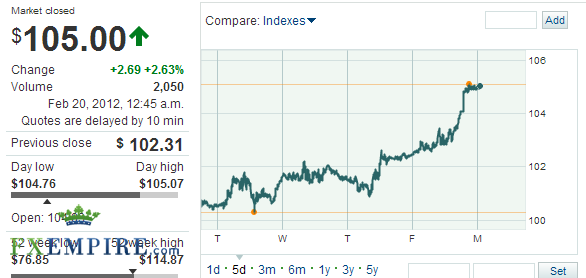Crude Oil climbed in overnight trading to hit a high of 105.03 after moves by China to ease monetary policy buoyed investor sentiment, while ongoing geopolitical tensions also lent support.

Over the weekend, the People’s Bank of China reduced major lenders’ reserve requirement ratios — or the amount of money banks must hold in reserve — to increase liquidity in the world’s second-largest economy.
The moves, coupled with expectations of a second bailout for Greece when Eurogroup ministers meet later Monday, helped lift stocks and commodities during the Asian session on Monday.
The news from Iran, sent crude oil spiraling upwards. Following a week of threats and economic rhetoric from the Islamic capital, yesterday Iran stopped selling crude to British and French companies, in a retaliatory measure against fresh EU sanctions on the Islamic state’s oil.
The markets had expected this and most importers have arranged alternative supplies, this is more a knee jerk reaction to the news.
“Exporting crude to British and French companies has been stopped … we will sell our oil to new customers,” spokesman Alireza Nikzad was quoted as saying by the ministry of petroleum website. After a week on news and statements from the Iranian OPEC minister, the spokesman has change for the week. It seems each week the government appoints another representative to be the center of the threats and news for the week.
The European Union in January decided to stop importing crude from Iran from July 1 over its disputed nuclear programme, which the West says is aimed at building bombs. Iran denies this. Iran’s oil minister had said on February 4 that the Islamic state would cut its oil exports to “some” European countries.
 The European Commission said last week that the bloc would not be short of oil if Iran stopped crude exports, as they have enough in stock to meet their needs for around 120 days. Industry sources told Reuters on February 16 that Iran’s top oil buyers in Europe were making substantial cuts in supply months in advance of European Union sanctions, reducing flows to the continent in March by more than a third – or over 300,000 barrels daily.
The European Commission said last week that the bloc would not be short of oil if Iran stopped crude exports, as they have enough in stock to meet their needs for around 120 days. Industry sources told Reuters on February 16 that Iran’s top oil buyers in Europe were making substantial cuts in supply months in advance of European Union sanctions, reducing flows to the continent in March by more than a third – or over 300,000 barrels daily.
The decision was not expected to have a big impact. France last year bought only 3% of its oil – 58,000 barrels a day – from the Islamic republic. Britain was believed to be no longer importing Iranian oil.
But it was seen as a warning shot to other EU nations that are bigger consumers of Iranian oil, including Italy, Spain and Greece.
Although those countries were not affected by Iran’s announcement yesterday, they are included in an EU decision to stop buying Iranian oil that was announced last month and which will take full effect from July. The EU move was part of a ratcheting up of Western economic sanctions on Iran over its disputed nuclear programme.
The EU’s new sanctions includes a range of extra restrictions on Iran that went well beyond UN sanctions agreed last month and included a ban on dealing with Iranian banks and insurance companies and steps to prevent investment in Tehran’s lucrative oil and gas sector, including refining. The mounting sanctions are aimed at putting financial pressure on the world’s fifth largest crude oil exporter, which has little refining capacity and has to import about 40% of its gasoline needs for its domestic consumption.
Originally posted here



